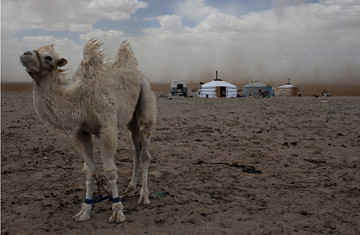
Nomads still live in traditional gers around Mongolia's biggest economic undertaking: the Oyu Tolgoi mine.
(3 of 6)
His ascendance to the presidency in 2009 came at a tumultuous point. The previous year, postelection riots broke out in the capital, Ulan Bator; a handful of people were killed, shaking the country's placid image. This year brought another political crisis. In April, Nambaryn Enkhbayar, a former President and Prime Minister whom Elbegdorj narrowly beat in the presidential election, was arrested in an anticorruption campaign. Security forces swarmed his home at dawn and led him away with a bag over his head.
Enkhbayar, head of a party that broke away from the socialists who long ruled Mongolia, has high-profile foreign friends. U.S. Senator Dianne Feinstein, who met Enkhbayar during a visit to Mongolia, rushed to his defense. "The allegations against [Enkhbayar] have been deemed by one of his attorneys to be 'insubstantial, stale and petty,'" she said in a statement. The ex-President went on a hunger strike, calling the arrest part of a personal vendetta by his successor. On Aug. 2, Enkhbayar was sentenced to four years in prison on corruption counts. He plans to appeal.
Enkhbayar's political career may be curtailed for now, but he represents a potent new strain in Mongolian politics. In May, just weeks before the elections for the legislature, parliament passed a foreign-investment law that requires majority stakes in certain large-scale projects to receive government approval. Approximately one-quarter of the members of parliament prevailed in the June elections by playing on the nation's fears of handing over mineral deposits to overseas investors.
Resource nationalism is effective politics, and it's natural for Mongolians to want to control their earthbound treasures. But the reality in Mongolia today is that foreign cash has transformed the economy. Last year $5 billion in foreign investment poured into the country, equal to half the nation's GDP. The biggest deal to date is Oyu Tolgoi, which will likely contribute one-third of Mongolia's GDP by 2020. But there are many other rich deposits to be unearthed, including the world's largest unexploited coking-coal reserve, at Tavan Tolgoi (Five Hills). Enkhbayar has called for Tavan Tolgoi to be kept a Mongolian venture. He has also urged a renegotiation of the Oyu Tolgoi deal, which currently guarantees a 34% stake for the Mongolian government. "Mining companies are driven by simple profits," he says. "I want to protect Mongolia's interests."
Cameron McRae, Oyu Tolgoi's chief executive, strikes a positive note. "You're always going to see some element of resource nationalism, but I'm not particularly concerned," he says. "This is the most important development project [for Mongolia] and is likely to be so for the foreseeable future." True enough. But remember this: in 2005, Robert Friedland, the former CEO of Ivanhoe Mines, one of the signatories to the Oyu Tolgoi agreement, compared the copper and gold deposit to a "cash machine" for foreign investors. Protesters in Ulan Bator responded by burning his image. In ever more open Mongolia, the new capitalism still intersects--and clashes--with the old socialism.
Walking a Tightrope
